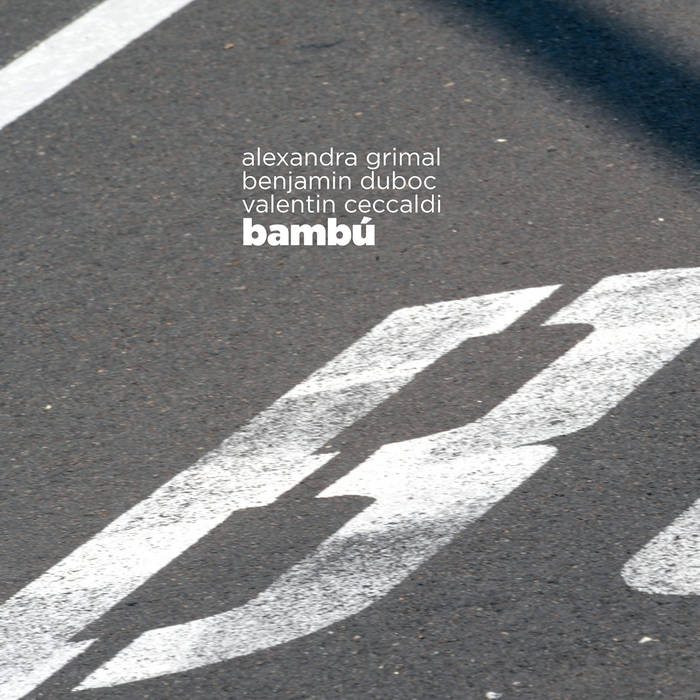
By Stef
For those of you who've read my previous reviews, they will remember that I hate "spoken word" in music, because most of the time it just doesn't work. This album is a unique exception. Why? Because Alexandra Grimal recites pieces of texts and poems without pretence, simple and eloquent.
The textual inspiration is "Respirer L'Ombre" by Italian sculpture Giuseppe Penone, a book he wrote on his vision on his art, which is focused on trying to experience nature from within. What is it like to feel nature like nature itself? The music on this wonderfully poetic album, performed by Alexandra Grimal on sax and voice, Benjamin Duboc on bass, and Valentin Ceccaldi on cello, has the same sensitivity. It is about touch, about hearing, about sensing closely. As a result the music has the kind of fragility and cautiousness that is required to reach out slowly, to caress, to sense, to hear, to to feel. At the same time, it can be hard and rough too. It is about organic growth, about forking out in different directions. About soil. About air.
Sax, cello and bass move together full of open wonder and full of attention for what's happening. This is free improvisation, but with no specific concern for any expected forms.
"Toucher" (touch) offers a quietly spoken text, with bowed strings in the background, about the sense of touch.
"Densité" (density) starts with a lyrical soprano solo, jubilant and joyful, later underscored by a deep bass until the cello enters full of aggressivity, electrified it seems, but it isn't. Grimal switches to tenor and the sounds get darker and thicker, visceral and yes, dense, and intense.
"Ombre" (shadow) consists of slowly plucked bass, unhurriedly, with Grimaldi murmuring whispering in the background, faintly, and only for a small part of the track, while Duboc's instrument keeps moving forward, resonating so closely that you can touch it.
"Image" starts with a collective quiet shimmering around the same tone, repetitively, floating in empty space. Grimal recites the text, breaking the words into pieces, repeating herself, half-singing, whispering, and then the music takes over, with now increasing changing intervals, a wonderfully circling of high and low notes, a dance of tenor and cello, supported by plucked bass.
"Empreinte" (footprint/fingerprint), without a doubt the centerpiece of the album, starts with careful bowing by both string instruments, hypnotically circling around a tonal center. Grimal joins the extended notes of the strings by wordless voice, copying the strings. Then the mood changes, getting darker and more ominous, with the dark and deep voice of Duboc reciting inaudible urgent words, followed by Grimaldi singing a high-toned girl-like song, whose innocence is in incredible contrast to the menacing bass and screeching cello and when silence suddenly emerges, the mood changes: Grimal's soprano imitates her earlier song, in a way that is entirely uncanny. Is it her sax or is she still singing? Her timbre is so close to the human voice. Then the music shifts again into full intensity, with soaring sax over repetitive insistent strings. It is raw, brutal and lyrical at the same time.
"Adhérence à la Terre" (adherence to earth) brings us back into quiet poetic territory, with barely audible words whispered in the intro, being replaced by sax over a silent background, gradually filled by intense strings.
"Respirer" (breathe) is again quiet and subdued in the beginning, with cello flageolet tones and deep bass sounds. Grimal's voice mystifies us again with its purity and beauty, and she keeps her calm as both strings go into a total frenzy.
This is a unique album. You will not have heard anything like it. Grimal's creativity knows no bounds (and no disrespect to the two other musicians). She is a musician with vision who dares to break any expectation that one might have of music. And truth be told, despite its name, even the words avant-garde or free improv already come with a whole bunch of sounds and approaches you can expect. Not here. She has surprised us before, and she keeps doing it.












0 comments:
Post a Comment